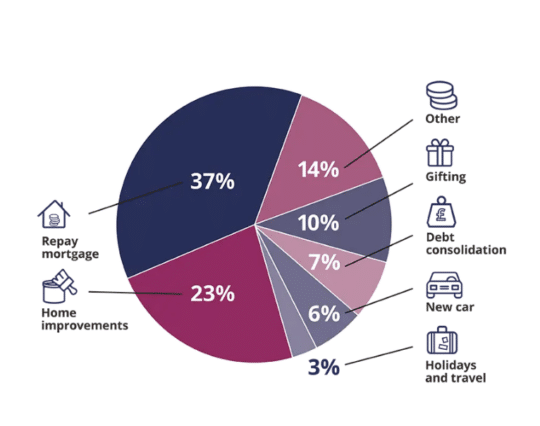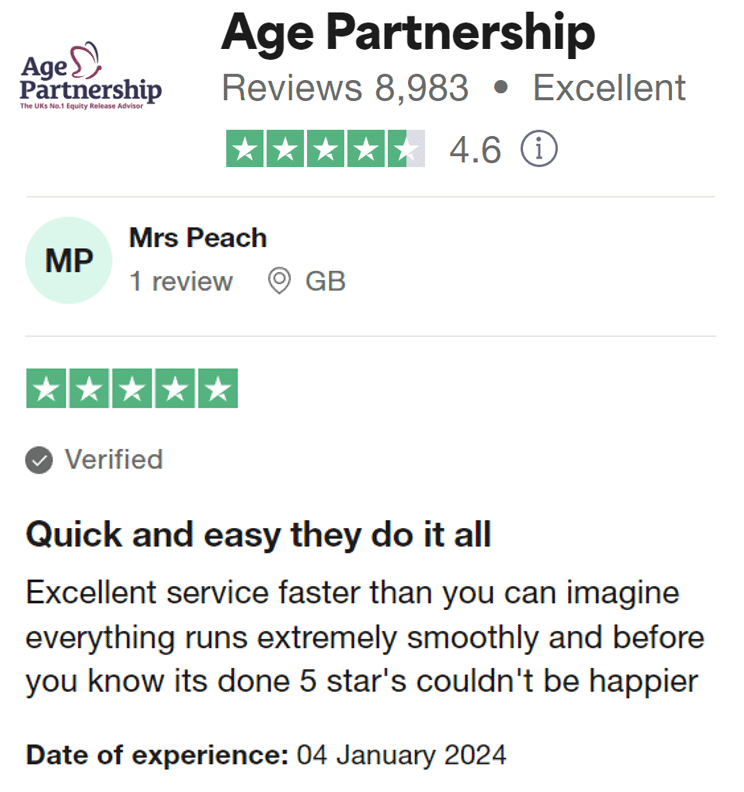Home Reversion Plan Calculator – How It Can Help You
Our preferred equity release adviser is Age Partnership. For free and impartial money advice you can visit MoneyHelper.

Our preferred equity release adviser is Age Partnership. For free and impartial money advice you can visit MoneyHelper.
Understanding how to unlock money from your home can be tricky. That’s where a home reversion plan calculator comes in handy. This tool helps to show how much money you could release from your home.
We know that the topic of equity release can be a bit scary – you might worry about debts and how it all works. But you’re not alone. Each month, over 7,000 people visit our website for advice on equity release.
In this guide, we’ll explain:
- How a home reversion plan calculator can assist you
- The importance of getting a realistic quote for your home
- The ins and outs of equity release and home reversion schemes
- The differences between a drawdown and lump sum home reversion plan
- How these plans are regulated and what the Equity Release Council is
Studies found that over half of equity release customers use equity release to fund home improvement projects.1 Our team has a good understanding of how you might be feeling. We’re here to help you make the best choices about your money.
Let’s start finding out more about home reversion plans and how they might work for you.
What is equity release and who can use it?
Equity release is used by seniors who own their own home and want to access large amounts of credit. It is one method of releasing equity that can be further subdivided into two types of loans, namely a lifetime mortgage or home reversion plan. Both these loans do not require any monthly repayments – keep reading to uncover how equity release loans do eventually get repaid.
Because equity release is only used by people over the age of 55, it is often used as a way to fund retirement, retire earlier than otherwise possible or for similar reasons. You must be releasing equity from a main residence with no debts secured by your property, which means you will usually need to have paid off your residential mortgage in full as well.
So, if these loans secured by your main residence do not require monthly repayments, how do they get repaid? They are only repaid when the last person named on the equity release plan either dies or moves into long-term care.
At this stage, the loan must be repaid in full and is made possible because the lender can force the sale of the property to raise cash. From the sale proceeds, the equity release lender recovers the money owed and the remaining funds are given to the homeowner if still alive, otherwise added to their estate.
Why do people consider equity release?
As mentioned, older homeowners usually consider equity release plans so they can improve their life during retirement, which could include general expenses, home improvements, holidays, private medical services and much more.
Some people use equity release as a way to give their loved ones an earlier (less valuable) inheritance to help buy a property or make investments. There can still be inheritance tax implications if money is given away within seven years of death.
Equity release can be a bit complex to understand without the right information, so here’s a quick table with some do’s and don’ts to make things clearer.
| Equity Release – DO… | Equity Release – DON’T… |
| DO Use equity release to fund sensible investments like home improvements, debt consolidation, helping family members. | DON’T Use equity release to invest in a risky scheme, to please family members pressuring you, to make a luxury purchase or holiday. |
| DO Seek professional advice from professionals who specialize in equity release. | DON’T Rush into a decision. Take your time, you are in control on this. |
| DO Understand the difference between lifetime mortgages and home reversion plans – and which is best for you. | DON’T Use equity release without fully understanding the terms. |
| DO Check for flexibility – look for plans that let you be flexible, like making partial repayments. | DON’T Forget to look at alternative options for raising funds. |
How can you do it?
Equity release includes two types of loans called a home reversion scheme and lifetime mortgage. Both of these loans work in a similar way by not asking for monthly repayments and only recovering the debt after the homeowner dies or moves into care – using the property sale proceeds.
But the two loans have some significant differences as well. Whereas a lifetime mortgage will charge a compounded interest rate and add this amount to the total owed each month, a home reversion scheme does not charge any interest whatsoever. Below we explain how a home reversion scheme works in full with a simplified example.
How equity release could help
More than 2 million people have used Age Partnership to release equity since 2004.
How your money is up to you, but here’s what their customers do…
Find out how much equity you could release by clicking the button below.
In partnership with Age Partnership.
How much money could you release?
How much money you could release will depend on your age, property value, further details about your property and the equity release lender you use. In general, the most amount of money you could release with a lifetime mortgage and home reversion scheme is 60% or 80%, respectively.
This means in the best-case scenario, someone with a £200,000 home could access as much as £120,000 or £160,000 using a lifetime mortgage or home reversion scheme. Most people release much less than these amounts.
What is a home reversion scheme?
A home reversion scheme is a type of equity release loan for senior homeowners. It usually provides the homeowner with a tax-free lump sum with no monthly repayments. This tax-free cash is not charged with any interest either, so how does the lender make a profit on the credit agreement?
The lender almost certainly guarantees to make money from the loan by getting the homeowner to agree to give them a percentage of their future home sale value.
For example, you might take out a loan worth 20% of your equity today but have to agree to give the lender 75% of your property’s sale value when you die or move into care. With most property prices increasing over time, this can make the overall cost of a home reversion scheme even more expensive, and some may say the cost is eye-watering.
» TAKE ACTION NOW: Find out how much equity you could release
What is the minimum age for a home reversion plan?
Equity release loans are only available to people over 55 years old and this applies to home reversion schemes as well. However, some home reversion schemes may set higher age limits, sometimes as high as 65 years old.
Any age restriction applies to both homeowners on the application. So if one homeowner is too young to apply they will need to wait until both homeowners meet the age requirement. You cannot apply for equity release loans with more than two people.
Are they regulated?
Home reversion lenders are regulated by the Financial Conduct Authority. You should only consider an equity release scheme that is offered by a legitimate lender that is authorities and regulated by the Financial Conduct Authority, otherwise, you are dealing with illegal companies.
Further regulation comes from the Equity Release Council. It is highly recommended to prioritise lenders that are members of this governing body. Find out why below.
Is it a good idea?
A home reversion plan can be a good idea for some people, and for others, there may be better alternatives.
People with children relying on receiving a significant inheritance will often find a home reversion scheme a more difficult decision. This is because the eventual cost to repay is high and this affects how much money is left in the homeowner’s estate.
You should get reputable financial advice to inform your decision.
How does a reversion company calculate its offer?
A home reversion company will tell you how much tax-free cash you could release using their loan. They calculate this figure primarily based on your age and property value. How much money you could release will usually rise in conjunction with your age, but each application is decided on individually.
You can usually get an idea of how much money you could release by using an equity release home reversion calculator.
What is a home reversion plan calculator?
An equity release calculator is an online tool that uses your information to project how much money you could release from your home and how much it could end up costing you to repay.
A lifetime mortgage equity release calculator uses interest rates because interest is applied to those loans, whereas a home reversion equity release calculator does not incorporate an interest rate because no interest is charged.
The user will simply add personal information such as their age, as well as their property value. This will be used to determine how much you might be able to release from your home, and illustrate what percentage of your property’s eventual sale proceeds the lender will demand in return.
Where can you find a home reversion plan calculator?
A home reversion equity release calculator can usually be found directly on home reversion lender websites. You may also find them on generic websites discussing and explaining how equity release works, including forums.
Another place you might spot them is on financial service websites, such as financial advice companies and brokers.
Lifetime mortgage equity release calculator
A lifetime mortgage equity release calculator uses your estimated property value and age to project the amount of money you could release and how much your debt would grow over different time periods. The calculator uses your property value estimates and a representative interest rate, so it may not be entirely accurate.
Should I trust a home reversion plan calculator?
An equity release calculator should be used as a guide only. The equity release calculator does not assess your personal situation in enough detail to give absolute certainties. The loan amount you are offered may be different to what is shown.
Join thousands of others who release equity
Age Partnership have helped over 2 million people release equity from their home.

Mrs Wareham
“I am more than pleased to have taken out Equity Release with Age Partnership.”
Reviews shown are for Age Partnership. Search powered by Age Partnership.
Drawdown vs lump sum home reversion plan
Many home reversion plans allow the homeowner to choose between a tax-free lump sum or drawdown facility. If they choose to receive their money as a lump sum, then they receive all of their money at once.
However, if they choose a drawdown, they will receive an initial lump sum and be able to access the rest of their loan when and if needed. The rest of the loan is kept with the lender in a cash reserve.
Choosing a drawdown home reversion scheme is not as beneficial as choosing a drawdown lifetime mortgage where doing so can avoid interest. But there are still some benefits of using a drawdown home reversion scheme, such as:
- Budgeting – it could help you budget throughout retirement or large home improvement projects.
- Means-tested benefits – it could mitigate your personal wealth and maintain your eligibility to receive means-tested benefits as you currently do.
What is the Equity Release Council?
The Equity Release Council is a group striving to improve standards and the reputation of the equity release sector. They do this by offering memberships to any company working in the industry, including equity release providers.
One way that the council aims to improve standards is through the group’s rules and guidelines. Every member must abide by these rules, which have predominantly been written to give senior homeowners greater protection, assurance and peace of mind. One of the most important rules they have made is the negative equity guarantee for people taking out lifetime mortgages.
How does a lifetime mortgage work?
A lifetime mortgage works by charging interest on the amount of money you release. Neither the interest nor the capital loan amount gets repaid in instalments. It all gets repaid once the homeowner dies or moves into care through the sale proceeds of their property.
By the time the homeowner needs to repay, the interest will have rolled up continually and made the total owed grow significantly. There are a number of variations of lifetime mortgages on the market.
Should I use a home reversion plan or lifetime mortgage?
Lifetime mortgages remain more popular than home reversion plans, and the former is easier to find. However, this does not necessarily mean you should always choose a lifetime mortgage over a reversion plan. You should discuss all options with an equity release adviser first.
Do I need financial advice before applying for equity release?
You need to get financial advice before applying for any type of equity release scheme. This is to make sure you understand everything about the equity release scheme and its long-term implications, including eventual costs. It is also used to explore alternative options and avoid equity release when possible and beneficial to do so.
Will the loan be taxed?
The lump sum or drawdown facility you receive via equity release is not subject to tax. However, giving the money away could make that amount subject to inheritance tax if it applies to your estate and ticks other boxes.
Can I lose my state pension after releasing equity?
You cannot lose access to the basic state pension by releasing equity and increasing your personal wealth. It is not possible because the basic state pension is not a means-tested benefit. Nearly everyone has the right to receive it without wealth being considered. However, you may lose access to other benefits, including Universal Credit and Pension Credits.
What are my other options?
Another way to create a lump sum of cash for your retirement is to move to a smaller property that is less valuable than your current one. By downsizing, you could create a pool of money to use for your retirement or any other purpose. But keep in mind the additional costs and stress of moving, especially in later life.
Things to consider
Equity release will involve a home reversion or a lifetime mortgage, which is secured against your property and will reduce the value of your estate and impact funding long-term care. Our equity release partner, Age Partnership provides a personalised illustration to explain the full details. The money you release, plus the accrued interest is then repaid when you die or move into long-term care. Advice is required before proceeding with equity release and any existing mortgage must be repaid. Age Partnership provide initial advice for free and without obligation. Only if your case completes would Age Partnership’s advice fee of £1,895 be payable. Other lender and solicitor fees may apply.


